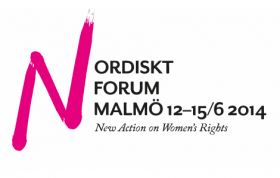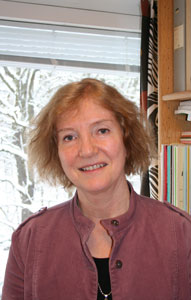The Nordic Women’s Movement Mustering up Strength
Motivational speeches, seminars, concerts and feminist theatre. Conference-goers at the Nordic Forum in Malmö have a lot to look forward to. This Thursday, members of the Nordic women’s movement will gather for the largest conference in 20 years.
The conference, which is expected to point out the direction for tomorrow’s gender equality policy is scheduled to open in just a few days. Almost 15 000 people will meet in Malmö for four days of seminars, panel discussions, film screenings, concerts and a lot more. Conference general Caroline Matsson is particularly happy about the great mix of lectures and discussions and cultural and hands-on events.
‘We shouldn’t just talk about action but also actually do something. It’s an inspiring programme full of positive energy,’ she says.
There will be a DJ workshop and a comics-making workshop. Drude Dahlerup, professor of political science at Stockholm University and UN Women adviser, likes the idea of making room for culture at the Nordic Forum.
‘The process of change is in many ways led by culture and culture workers. That’s what happens when politicians lose momentum and stall,’ she says.
Dahlerup was there when the Nordic women’s movement met in Oslo in 1988 and in Åbo in 1994. She particularly remembers the conference in Oslo as a fantastic manifestation.
‘It was euphoric. We showed that we can work together, across political divides. It was big, very big,’ she says.
The conference in Åbo in 1994 was different, not least because of the conflicts surrounding the EU membership.
‘It led to serious friction and fragmentation in the women’s movement, at least in Denmark,’ says Drude Dahlerup, who believes that next week’s conference can help the movement muster up new strength.
‘This time no major issues should get in the way. And we actually stand very united against right-wing extremism,’ she says, but stresses that the movement is certainly not free from conflict and debate.
‘Definitely not. There are socialist feminists, liberal feminists, existentialist feminists, antiracist feminists, queer feminists and radical feminists to name a few, but that’s not a bad thing. I love the lively debates within the movement,’ she says.
Entire womens’ movement not included
Fakhra Salimi leads the Norwegian organisation MiRA – Mira Resource Centre for Black, Immigrant & Refugee Women. She will participate in several events at the Nordic Forum, but is disappointed in the planning of the conference and feels that the whole women’s movement has not been included.
‘There isn’t a single racialised woman in the steering group. I think that’s a big failure. Racialised women have been invited to participate but not to help set the agenda,’ she says.
MiRA has asked to be included in the steering group for the Nordic Forum without success. The steering group consists of an umbrella organisation from each Nordic country and no new organisations have been accepted into the group since it was formed in 2011.
Salimi says that racialised women were also excluded from the group that wrote the draft of the final document that will be handed over to the Nordic gender equality ministers after the conference. She feels that somebody should have reacted. She remembers that the same thing happened in Oslo in 1988; racialised women were invited to participate in the conference but did not have an opportunity to influence the agenda.
‘Åbo in 1994 was different. We were included from the beginning, so what’s happening now feels like a step backwards. We really thought we had come further than that,’ she says.
Conference general Caroline Matsson agrees that the representation has not been perfect.
‘It has been a clear goal to include everyone. But if MiRA are disappointed, it’s of course important that they express their views and that we as conference hosts listen to what they have to say,’ she says.
‘These are important issues. We need a discussion about our work and about who gets to be part of it,’ says Matsson, who has not been involved in the design of the steering group but serves as spokesperson for the conference.
Inequality in the labour market important focus for the movement
Creating an inclusive women’s movement and formulating a type of feminism that is broadly relevant is the most important challenge for the Nordic women’s movement, according to Salimi. She also mentions the inequalities in the labour market as an important area to keep focusing on.
‘Racialised women in particular are used as spare labour and are also overrepresented among involuntary part-time workers,’ she says.
Dahlerup too believes that the conditions in the labour market and ‘the deterioration of employment security’ need to be addresses as central issues by the women’s movement. She also mentions the sexualisation of young women and hatred against women in the public space as important challenges. Dahlerup says that the Nordic women’s movement has had to learn how to handle backlashes since the conference in Åbo in 1994.
‘Back then, we thought we could only move forward. We were sure that change happens if you just give it time, but that’s not true,’ she says.
She feels that the political scene has changed fundamentally, especially in a global perspective.
‘Right-wing forces are advancing their positions and the international women’s movement has to fight hard to maintain status quo. I want the Nordic countries to push a clearer agenda and show leadership, like we did in the 1980s and 1990s,’ she says.
Conference general Matsson hopes and believes that the Nordic Forum will have ripple effects also outside the Nordic region.
‘We have participants from over 40 countries. Afghanistan, Bangladesh, Ghana, Mexico – it’s great!’ she marvels and goes on to say that authorities, organisations and politicians in the Nordic countries have shown compelling interest.
‘We have invited the whole society to help formulate tomorrow’s gender equality policy and the response has been huge,’ she says.
She wants to particularly encourage conference participants to attend the opening ceremony on Thursday and the closing on Sunday.
‘That’s when you realise how many we are. In between those events, we’ll be rather scattered. Some might be there just for the films and others for the gender mainstreaming seminars,’ she says.
She also wants to encourage the conference-goers to challenge themselves and expand their horizons.
‘Don’t attend only the stuff that feels familiar and safe. Try to discover something you don’t know anything about or listen to somebody who doesn’t share your opinions. If you do, I promise the conference will be a great learning experience.’
- Text: NIKK
- Categories: Gender equality and welfare policy
- Published: 2014-06-11



